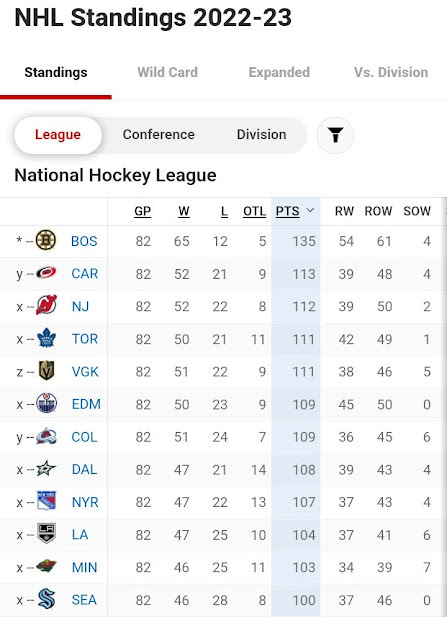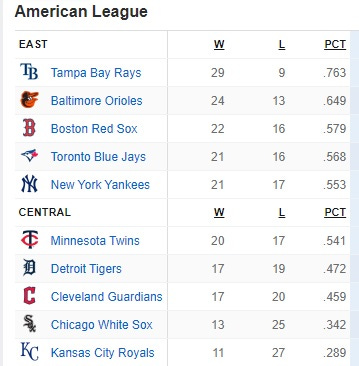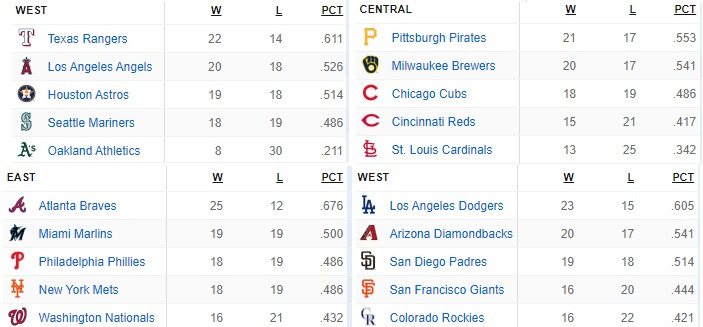Another blurt about numerical oddities in selected professional sports
Trigger warning: This will bore most of you comatose
A month ago, both the Boston Bruins of the National Hockey League and the Boston Celtics of the National Basketball Association—teams I strongly rooted for as a kid and track in a mostly residual way now—stood a real possibility of winning championships this spring.
The Bruins, in fact, set an NHL record for wins (though not winning percentage) in the 2022-2023 regular season with 65. And they were the best team in the league by a jarring margin: The B’s had a 22-point margin on the #2 team, while the second- and tenth-best clubs were only ten points apart.
Yet the Bruins were knocked out of the playoffs in the first round by the Tampa Bay Lightning Florida Panthers, which won only 42 of its their 82 regular-season contests.
Part of the allure of seeing a Boston team play for a title is the possibility of watching a championship-final-series playoff game Denver at the Pepsi Center, as both the Colorado Avalanche of the NHL and the Denver Nuggets of the NBA are in difference conferences from their prospective Beantown rivals. The Avalanche was the defending Stanley Cup champion and tied for the second-best record in the Western Conference, but like the B’s were knocked out in the first round of the playoffs in a seven-game series, falling to the Seattle Kraken. (This trend of singular nouns for pro sports teams I can take, but someone should place a moratorium on really stupid names like “Kraken,” even or especially ones voted for by locals.)
The Celtics, meanwhile, amassed the second-best record in the NBA’s Eastern Conference in the 2022-2023 regular season, while the Nuggets were the top team in the Western Conference. There’s still a chance of a Celts-Nuggets NBA Finals match-up. Denver sports fans have to be amped over the possibility of a Nuggets title; Denver joined the league for the 1976-77 season, but has never even been to an NBA Finals, let alone won one. That’s 47 seasons of not getting past the Western Conference Finals—which Denver has only reached three four times, most recently in 2009 the covid-shortened 2020 season.
Both clubs are playing in conference-semifinal series that could end tonight. The Celtics are down three games to two in their best-of-seven series against the Philadelphia 76ers, who have possibly the best and easily the scariest center in the league in Joel Embiid. (These clubs were ferocious rivals in the 1980s, when Larry Bird and Julius Erving were the centerpieces of various brutal Eastern Conference Finals squarings-off. Bird deceptively resembled a gigantic non-athlete, whereas “Dr. J” remains one of the most magical above-the-rim players in history.)
Game of the Eastern Conference Semifinals 6 is in Philadelphia, so the odds are against the Celtics surviving the night. The Nuggets are in a far better position; they’re playing a road game tonight as well, but are up three games to two against the Phoeniz Suns.
Lastly, the Major League Baseball season is almost a fourth of the way through its 162-game schedule. That makes this snapshot of the standings after last night’s games really weird:
Because the last-place New York Yankees have a better record than the first-place Minnesota Twins, if the word “central” were taken out of the screen grab above, the presentation would remain mathematically coherent.
In fact, only three of the twenty-five non-AL East teams in all of Major League Baseball currently have a better record than the cellar-dwelling, but playoffs-contending, Yankees, one in the AL and two in the NL:
This would make an interesting balls-in-boxes problem for what remains of the brains of the FiveThirtyEight crew: Given thirty units grouped into six five-unit blocks, what are the odds that every member of a single block will outperform all but three individual members of other pentads, given 37 or 38 match-ups?
This arrangement has, I suspect, resulted more from the vagaries of teams’ schedules to date than of the AL East being this dominant in talent; the Boston Red Sox, for example, have played only 14 of their 38 games (37 percent) against intra-division rivals, whereas by season’s end the total will be 76 out of 162 games (47 percent). In fact, knowing this quirky stuff will even out is the fun of pointing out before that happens.





